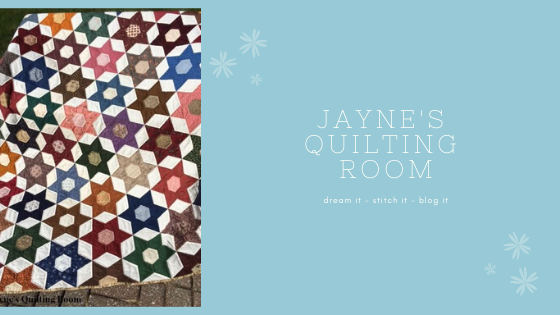About a week ago, I posted about the hand-stitching project I worked on when the Frankfort Girls met at Sheryll's. If you want to go back and
read that post, I will wait...
Did you read all the way down to the comment? Karen, a no-reply commenter, asked if I would do a tutorial on making these, so today, I will show you step-by-step how I did it. Is it the only way? Of course not. But it's my way. So let's begin.
First I will explain that when I cut out that first batch of hexagons - hexies, for short - I had a proper template. Since it was borrowed and now returned, for demonstration purposes here, I am using one of the hexies as a template. If I were going to need lots of them, I would certainly get a real template. Another option for a hard-core hexie project, would be to use one of those die-cutters - I think 2 popular brands are Go-Cutter and Cricut.
Since my hexagon is 4" wide, I cut a strip of fabric to that width. Then I lay the template on that strip and line up my ruler for the first cut.
I definitely layer several fabrics and cut multiples to save time. Depending on how skilled you are with a rotary cutter and ruler, you could easily cut 6 or 8 layers. I would not feel comfortable doing more than that, but perhaps really confident seamstresses would.
Cut as many as you need or want in whatever variety you want. Since I am just stitching to be stitching and I don't have a particular project I'm cutting for, I stopped cutting when I was sure I had plenty to keep me busy for the next few get-togethers with the girls.
And that pretty much sums up my cutting method.
Moving on to my sewing method: I considered doing the EPP (English Paper Piecing) method for these, but that is an extra - and somewhat tedious - step that I knew I could skip. If I were working with tiny little hexies, I probably would have used the EPP method, but with these big boys, I knew I didn't need to.
Let me say here that I truly enjoy hand-piecing and all hand-sewing. I always have, and I don't rightly know to what this can be attributed. Off the top of my head, I can think of about 5 full-size quilts that I have hand-pieced. (The 6-pointed star that I am currently hand-quilting was entirely hand-pieced. Interestingly, it has a hexie in the center of each star.
Click here to take a quick peek.)
The key thing to remember when sewing hexies is NOT to sew end-to-end. You have to leave a quarter-inch free at each intersection in order to turn the hexie into the next piece of fabric without having little puckers and pleats. In the photo above, my finger is pulling back the fabric to show the quarter-inch seam allowance. If you look at the other corner, you can see how I turned the corner leaving the seam allowance free of stitches.
Here's another angle of a turned corner. I often take a stitch on top of a stitch at intersections just to add strength. You can see that I have not drawn stitching lines, but you could. I probably did draw lines when I was a beginner, but I've been hand-piecing for so long now that I can pretty well 'eye-ball' my seam lines. I have noticed that using a smaller needle will yield smaller stitches, but I usually just grab whatever needles happen to be handy.
Here is a block ready to be added to the project. I match it with the edge of the piece I'm stitching it to and begin a quarter-inch in from the the edge. Note where my needle is inserted above.
I work my way across the block taking about 3 stitches at a time before pulling the thread through.
When I get to the end, I either knot it and snip the thread, or I take a second stitch at the end before turning the corner and beginning the next seam. If you really study the seam above, you can see that my quarter-inch is not exactly true all the way across. If I get way, way off, then I will remove stitches and do it over. In this case, I think the discrepancy is negligible, so I am leaving it as is.
The quilt police aren't going to inspect this so carefully as to call me on this or any other less-than-perfect aspects of my work, which I assure you, are plentiful! I know that imperfections exist in all quilts, so I have learned not to sweat the small stuff. If I were a total OCD-type, however, I can see where this seam would be troublesome.
And there you have it. My tutorial on making a hexie project. Leave a comment if something needs additional explanation. What seems basic to me might not be so crystal-clear to another, and while I am by no means an expert, I am glad to help if I can.
Happy Quilting, Friends!











































